23 January 2024 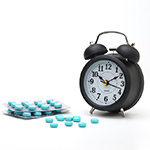 The more medication you're prescribed, the harder it is to make sure you administer it correctly. No matter whether you're suffering from dementia, or just wanting to keep on top of your pills, these Medication Alarms are each designed to fit discreetly and seamlessly into your life for a practical and un-intrusive solution. |
1 June 2017 | John 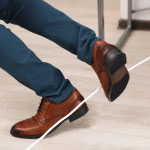 A normal home can pose a vast variety of hazards to elderly individuals. From bed falls to overflowing baths, elderly people can be susceptible to a huge range of dangers you may not even know exist. Check out our infographic and learn how you can protect your loved ones from hazards in your home. |
23 December 2015 | John  Personal alarms come in a range of shapes, sizes and designs, and can greatly benefit the elderly. Personal alarms can help keep them safe, make it easier for them to get help and even enable them to regain some of their lost independence. |
23 December 2015 | John  Infrared motion sensors might seem like the work of Hollywood, but in reality they are one of the best ways to detect motion. Used in both high tech and low tech security systems alike for the same reason, they are almost impossible to trick. |
23 December 2015 | John 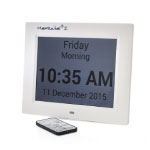 Dementia affects a huge amount of elderly people – one in three people over 65 will develop dementia – and its effects can be upsetting and destructive for both the victim and those around them. But there are things you can do to ensure that your loved ones with dementia can continue to live their lives safely. |
22 December 2015 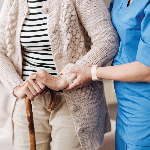 Care homes are a natural fit when it comes to environments for care alarms. From monitoring doorways to making sure water isn’t left running in bathrooms, care homes may have a dedicated team working to keep residents happy and safe but there are some things even the most committed of carers need a little help with. That's where CareAlarms.co.uk and our extensive range of devices can help. |
22 December 2015 | John The Carephone are an experienced company in creating and developing assistive technologies. For over 20 years they have been working to enable the elderly and vulnerable to live their lives more independently while being safe in the knowledge that help is not too far away. |
21 December 2015  There was a time that when you started to lose your mobility, you suffered from a long-term condition or even just got a little older, independent living would be the first thing to go. It simply wouldn’t be safe to remain on your own when each day was a battle. It’s understandable. Hard, but understandable. That time, however, has gone. |
21 December 2015 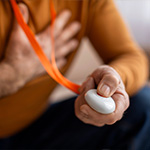 Feeling safe in our own home has always been a high priority, from when we were children to adults to growing older. That shouldn’t change as we venture into the realm of old age. If anything, it is even more important. |
21 December 2015 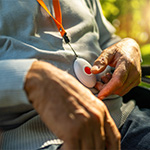 Maintaining your independence means holding onto your confidence in your own home. There are alarms to monitor your every move – whether you leave a chair or a bed, whether doors open or movement is detected. If you fall, if you are in any distress or even if you just need assistance, there is a button at hand to summon aid. |
21 December 2015 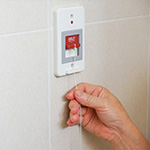 Accidents are just as likely to happen in the home as they are anywhere else. In fact, they have a higher chance due the familiarity with the home environment. This leads to carelessness and all it takes is for something to be a in a different position… |
21 December 2015 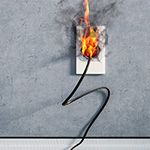 You wouldn’t be alone if you said you neglected your home fire alarm, taking batteries out to slip into the TV remote, or turning it off after cremating your morning toast, but no one would ever want the same thing said about those of a public space. A large building, hundreds of people and a sudden fire alarm can seem like the perfect recipe for panic, but not being able to alert everyone to a fire can have far more serious repercussions. We might all dislike the high pitch whine of our home fire alarm disturbing our dinner time, but imagine not being able to hear this crucial alarm at all. It was this scenario that led to the creation of the Silent Alert Fire Safe, an innovative fire safety mechanism for the deaf and hard of hearing. |
21 December 2015 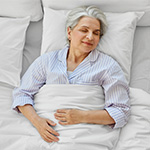 Care is universal, which is why here at CareAlarms.co.uk we stock a range of devices for every room in the house, and beyond. From the slippery hazards of a damp bathroom floor or the fire hazards of the kitchen, heading out and about, or needing to know when someone’s coming back in, we have a huge selection or alarms, motion detectors, monitors and pagers to make sure safety is always assured. |
21 December 2015 Telecare is at the root of all care alarms. It is the technology that makes it possible, the ideas that make it plausible. It is the be all and end all of independent living. Well, not quite. |
14 December 2015 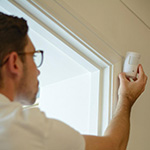 In this day and age, there are many different technologies that work by reacting to a human’s presence or absence. We cannot walk down the street without something reacting to our movement – automatic doors, hand-dryers and burglar alarms to name just a few. We live in an automated world. |
14 December 2015 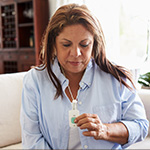 Arming your grandparents or parents with panic buttons and fall alarms is a great way of keeping an eye on them. Whether the signal is sent to a carer or to yourself, you know you will be informed if something happens to them. |
14 December 2015  There are so many potential alerts to be aware of. At once you could be watching the kids, running a bath, putting dinner in the oven and keeping an ear out for the phone or doorbell. But if you suffer from a certain disability or condition, or care for someone who does, the range of potential alerts you need to stay aware of complicates considerably. |